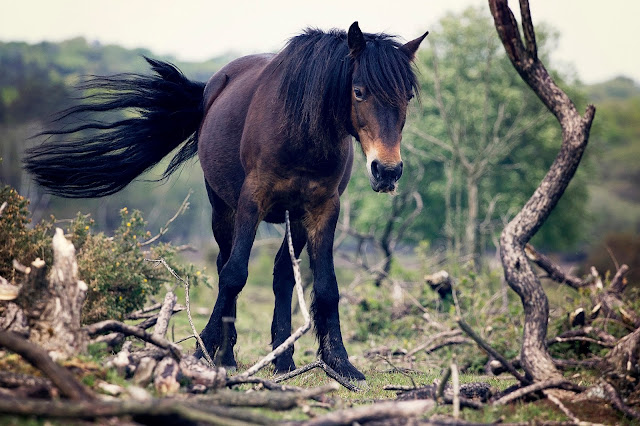Eavan Boland is on the 2017 and 2018 Higher Level English course.
She was born in Dublin in 1944 into the family of a diplomat and a painter. Her father, Frederick Boland, was the first Irish ambassador to Britain and to the United Nations. Boland is a graduate of Trinity College. She is professor at Stanford University.
The most recent question on Boland came up on the 2011 paper.
“Boland’s reflective insights are expressed through her precise use of language.” Write your response to this statement, supporting your answer with suitable reference to the poetry on your course.
Very broad question!
Reflective insights gives you the freedom to talk about any theme.
Precise use of language calls for an examination of her imagery.
More or less any Leaving Cert poetry question will ask your to examine themes and imagery.
The War Horse
Summary: the image of a loose horse roaming through gardens and destroying plants is used to discuss violence in Northern Ireland.
The title presupposes an image of a militant horse. At first glance, we encounter something completely different. The horse is only a natural creature roaming though its surroundings. It is causing destruction simply though its movement. It lacks insight into the damage it is causing. The image creates an atmosphere of tragic misunderstanding, such a precise and insightful way to examine the difficult subject of violence in Northern Ireland.
This dry night, nothing unusual
About the clip, clop, casual
Iron of his shoes as he stamps death
Like a mint on the innocent coinage of earth.
The concept of death and the adjective casual are juxtaposed in this sentence. (Juxtaposition is the placement of two things beside each other to produce a contrasting effect.) This draws the readers attention to the idea that death has become casual in this setting. Casual iron of his shoes minting the innocent earth is a simile for the impact that violence has on defenceless civilians. The verb stamps describes something both irreversible and flippant: it is easy to stamp something, but you cannot “unstamp” it. Just like shooting a gun at a someone: it is easy to pull the trigger, but it cannot be undone. Great choice of words, isn’t it? This is the kind of thing that counts as precise use of language. Note that the speaker seems calm: there is nothing unusual about the experience. This is probably a critical comment on how desensitised people tend to get to death when it constantly happens around them.
I lift the window, watch the ambling feather
Of hock and fetlock, loosed from its daily tether
In the tinker camp on the Enniskerry Road,
Pass, his breath hissing, his snuffling head
Down. He is gone. No great harm is done.
Only a leaf of our laurel hedge is torn—
There is an obvious change of tone from the beginning of the poem. The speaker goes from being contemplative and calm ( even observing the details of the joints on the horse’s legs: hock and fetlock) to anxious. Note the rhythm: Down. He is gone. No great harm is done – as if the observer breathed very shallowly as the enemy was passing by so that it wouldn’t notice her, and now she can breathe again in relief as evidenced by the lengthening of her sentences. This is another good example of precise use of language: sentence structure can serve to convey a feeling as well as choice of words. It also appears like she is consoling herself after the invasion to try to move on: after all, no great harm is done. Perhaps, this is also a remark on how people cope when subjected to violence, by telling themselves that it’s not that bad after all. Indeed, later in the poem the speaker confirms that she feels relieved and can breath again:
[I pause, wait,
Then to breathe relief lean on the sill
And for a second only my blood is still]
Of distant interest like a maimed limb,
Only a rose which now will never climb
The simile is deeply unsettling. Just two lines back the speaker was relieved: it was no big deal after all. Perhaps, this just shows that the speaker feels she is lucky to be alive after the passage of the horse unlike the crocus, one of the screamless dead:
The stone of our house, expendable, a mere
Line of defence against him, a volunteer
You might say, only a crocus, its bulbous head
Blown from growth, one of the screamless dead.
But we, we are safe, our unformed fear
Of fierce commitment gone; why should we care
If a rose, a hedge, a crocus are uprooted
Like corpses, remote, crushed, mutilated?
This is a remark of the attitude of those who aren’t harmed to those who are suffering. The poet points out the callousness of this approach.
He stumbles on like a rumour of war, huge
Threatening. Neighbours use the subterfuge
Of curtains. He stumbles down our short street
Thankfully passing us. I pause, wait,
Subterfuge is a rarely-used latinate word for deception or deviousness. Why the latinate word? Perhaps the poet is pointing at all the bureaucratic complexities of a peacemaking process that are used to avoid actually addressing the problem. The politicians, diplomats and negotiators are behind curtains, not exposed to the violence, but they are the ones who we rely on to end the violence. The fact that her father was the Irish Ambassador to Britain is significant in this context as the poet is speaking of violence in Northern Ireland.
Then to breathe relief lean on the sill
And for a second only my blood is still
With atavism. That rose he smashed frays
Ribboned across our hedge, recalling days
Of burned countryside, illicit braid:
A cause ruined before, a world betrayed.
Ultimately, this poem is very sad: nobody stands up to violence or even contemplates doing so. The victims are: only a leaf… only a rose… only a crocus. The repetition of only marks the both how expendable the victims are as well as how unsupported and defenceless they are. The repetition is subtly spread throughout the poem. However, the speaker confronts the reader directly with a sobering truth in a final remark: a world betrayed. Both the plants and the horse are beautiful natural things that should peacefully coexist. Instead, the unformed fear of the speaker and the neighbours betrayed this peace. This poem courageously and insightfully exposes fear and indifference as being causal to this suffering.

